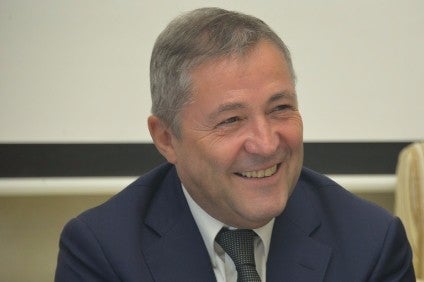
Russian Machines is optimistic the nascent signs of recovery witnessed recently in the country will translate into sustainable sales as consumers carefully start to spend modestly again.
The company, parent of GAZ Group, is a colossus in Russia with 50% of the LCV market, 80% of buses and 30% of AWD, although with the former downturn domestically, has turned its eyes increasingly to export markets.

Discover B2B Marketing That Performs
Combine business intelligence and editorial excellence to reach engaged professionals across 36 leading media platforms.
In 2013 for example, it sent product overseas to around 23 countries, while last year that had almost doubled to 45 and it wants to ramp up that rate of growth even further to 80-90 countries in the next five years.
Closer to home, Russia has witnessed some rare good news in the last few months as new passenger car sales rose 15% in June – the fourth straight month of increases after years of sharp falls – although in the LCV segment the results were more modest – 5% growth in the first half of this year.
The relatively bright data – after 50% was wiped off volumes in the previous four years – may be a signal the Russian market is starting to turn the corner in terms of growth but the country is notoriously susceptible to external forces – not all of them economic.
“Even with what happened in 2014/15, the economy can recover with sanctions in place,” Russian Machines CEO, Manfred Eibeck told just-auto. “It did destroy growth plans the country had but now it recovers – we can work on that basis. The bottom has been reached, for us it was last year. We were informing for the last year we saw an increase in volume.
“We had a new product line which helped us; we added volume and we expanded 6%-10% last year. We have a product which is globally competitive – we went to Hanover last year and presented our fleet and we surprised a lot of customers. We understand what to do in other countries and what tools we need.”
Despite signs of a modest recovery in Russia, the country nonetheless remains almost uniquely exposed to outside influences, be they political through international sanctions or economic generated by unpredictable fluctuations in oil prices.
GAZ is also vulnerable in part as it produces a large number of commercial vehicles, which mirror in many ways the business health of an economy, but recent data emerging from Russia coupled with its export drive, are giving the producer some grounds for real optimism.
“Our growth has to come from export,” added Eibeck. “We focus on Africa, Latin America, Asia and the Middle East. The product must be competitive – it must be at a level of international excellence [and] we did invest to upgrade our model lines.”
An example of GAZ export business was the recent inking of its contract to supply GAZelle Next vans to Jordan through distributor, Al-Sultan. GAZelle Next products are multi-purpose commercial vehicles for different businesses and passenger transport, which are adapted for operation on poor roads and in hot climates.
Closer to home, GAZ has embraced localisation mandated for overseas companies through Decree 166 and has entered into several collaborations of its own to maximise efficiency of domestic labour and skills.
The first wave of overseas automotive companies to use 166 rolled into Russia after 2008, especially component manufacturers in areas such as seating, bumpers and stamping, while GAZ used its long experience in the market to team with foreign companies such as Volkswagen and Mercedes.
“[At] GAZ, we started to do a lot of localisation for international, for example, we produced axles for Volkswagen and we produced stamping for all Mercedes Sprinters,” added Eibeck. “The next wave must be about electronic components, hydraulic systems and more complex modules.
“There are only a couple of suppliers here [Russia] – I think we should cooperate with Russian suppliers and go for joint ventures on this.
“We need to localise for specifics of his market, for example, steering systems in our LCVs, we should have a local solution. If we have this as a global platform I want to have control of that as close as possible.
“Supplier content of Russian suppliers is now audited and monitored as international suppliers [are]. A Russian supplier only has a chance if he [meets] international requirements – that is a logical move. That is happening and Russian suppliers are coming to better quality, otherwise [they are] only there for a while; the survival of the fittest.”
GAZ is self-sufficient in many ways, for example, using its own casting imminently for its engine line in Yaroslavl after previously sourcing from Germany. “It was recommended to buy this from Germany because of the complexity of the parts, but we are producing, we learned how to do it,” added Eibeck.
“We [also] have a joint venture with Bosal [for example] – we will continue to do this type of cooperation but on the other hand we also [use] international technology.
“Contract manufacturing is a business we will continue to do. It was [is] very successful with all three customers even if General Motors left, but they did not leave because of us.”






